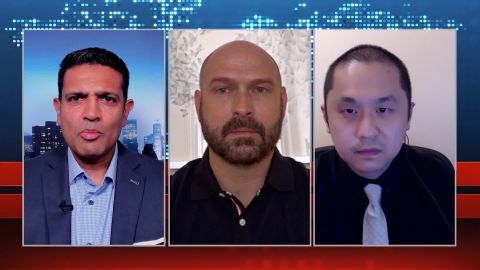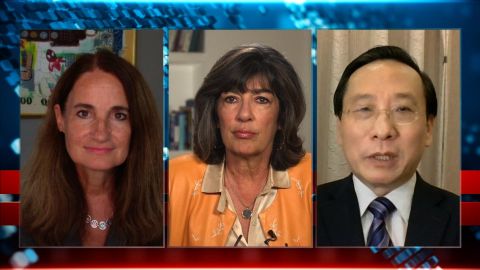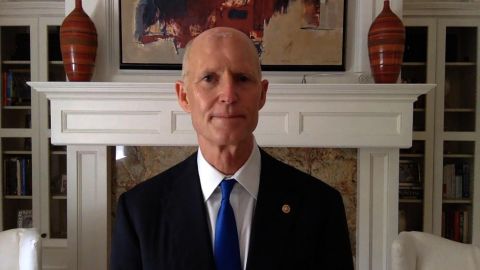Read Transcript EXPAND
CHRISTIANE AMANPOUR: Now, how coronavirus affects the body is still unclear, particularly the impact on those who are sick with the illness for months, People like our next guest, Michael Reagan. He was fit and healthy before contracting COVID-19 in March. And, since then, he’s been in and out of New York’s Mount Sinai Hospital. Here he is talking to our Hari Sreenivasan, along with alongside Dr. Zijian Chen, the medical director of Mount Sinai’s post-COVID care department.
(BEGIN VIDEOTAPE)
HARI SREENIVASAN: Christiane, thanks. Michael, I want to start with you. Describe what you have been living with.
MICHAEL REAGAN, COVID-19 PATIENT: OK, starting March 22, I woke up. That was my first day have any kind of symptom. I woke up in the morning, and I felt like I had a fever. I sat up. I couldn’t catch my breath. I went to the bathroom and immediately coughed up blood. I ended up in the hospital, the E.R. that day, where they went ahead and swabbed me, and it came back positive. And since then, I have had a whole litany of symptoms, ranging from the pulmonary, cardiovascular stuff and a lot of neuro issues.
SREENIVASAN: So, give me an example. What does that mean?
REAGAN: I still am having a hard time catching my breath, a lot of chest pain, especially on the left lung. Any kind of activity results in a coughing fit for hours. My heart rate at rest gets up sometimes to almost 200 beats a minute.
SREENIVASAN: Wow. That would be — that would be most people running at a full sprint, the maximum they could possibly do. And you’re saying that, even if you’re sitting down, your heart rate is that fast?
REAGAN: And it seems to be worse at night, when I try to lay flat. I have noticed the symptoms get a lot worse, both the breathing issues and the heart issues, a lot of pain, and like rapid heart rate and hard time catching my breath. So, there’s those symptoms. And the neuro symptoms are the ones that I really didn’t begin noticing until about May, the middle of May. I was on the phone one day and I just had a seizure. And then, about five days later, I had another seizure. And then I started noticing tremors in my hands, and really troubling memory loss. I’m talking about getting lost when I was going somewhere or repeating myself over — people around me actually noticed it before I noticed it. My partner and my family and some co-workers were a little concerned, because I would call them up and have a conversation and not realize I had just had the conversation with them an hour before.
SREENIVASAN: Is there any history of anything like this for you or for your family or for your friends? Do you have any kind of allergies, any medications that you’re on that could have possibly lead to any…
REAGAN: No. In my past, I had a history of mild asthma. So, during summertime, when it got really hot, I would just carry an inhaler in case I needed it. But I never have had issues like this. I have always been very high-functioning, always on the go. I’m very active, both in my professional and personal life. And I have like an elephant’s memory typically, before this. And it’s funny. Right now, I’m able — I don’t know how — exactly neurologically what has happened,. but I’m able to recall vividly things from when I was 7 years old. But I can’t remember anything about the first half of today.
SREENIVASAN: You can’t remember anything about the first half of today, but you can remember things from your childhood?
REAGAN: Exactly, like details.
SREENIVASAN: Dr. Chen, this might seem an overly simplistic question, but what’s happening inside Michael’s body? Why is this happening to him?
DR. ZIJIAN CHEN, MOUNT SINAI CENTER FOR POST-COVID CARE: I wish I actually had an overly simplistic answer for you. Right now, we’re not sure. We do have ideas. One of the prevailing ideas is that the infection itself, the initial infection, caused a very, very acute response with the immune system. And what that can do is that can actually damage Michael’s organs. And, because of that, what ends up happening is this collateral damage, if you can call it such, is now in long term affecting what’s — Michael’s organ systems.
SREENIVASAN: Yes, how many people like Michael, I mean, kind of dubbed the long-haulers, are you studying at your hospital?
CHEN: Well, currently, we have more than 300 people that we have seen come through the center. These patients, we have evaluated. We have sent to our specialists who have been taking care of COVID-19 patients since March and April. And we have a very long waiting list as well. Currently, I believe we’re having a waiting list that’s up to three months’ long. And when we see — when we saw this, we’re actually actively expanding what we can do in regards to seeing these patients.
SREENIVASAN: So, Dr. Chen, the CDC recently had a study out that said a little more than a third of people that they surveyed over the phone who had COVID-19 were not back to normal two to three weeks out, right? So that is automatically way worse than the flu. What percentage of the people who have COVID have the types of symptoms or these long-term effects, like Michael is living through?
CHEN: I don’t think anybody knows the answer to that question. We’re still at the acute phase of the infection in some parts of the country, meaning what we’re doing in New York, being able to see these long-term COVID patients, much of the country has not been able to do that. And while I hope that number is less overall, as we do more population studies, there could be a chance that it’s actually more and that there are patients still quarantined at home that has not been evaluated, because doctors are afraid to open their offices to these patients.
SREENIVASAN: Michael, I have got to ask, did you ever think you were going crazy here? Because most of your friends, if they’re watching the news, most doctors, none of these things that you’re describing in any way lined up with COVID.
REAGAN: Yes, I found it a little bit frustrating and overwhelming, especially some of the less informed contacts I have, whether it’s family or co-workers or friends, who might have read some misinformation on the Internet and swear that they know COVID. And my experience, my reality was so very different. I found it kind of sad, and it would make me angry every time I would hear someone say something that was just not true, like, well, I have a friend who had it, and they were only sick for two days, or I think it’s just a hoax, or on and on and on. And so, at first, I got really angry when I started hearing these things. And I realized I can’t tell everybody who was misinformed and ignorant to go kick rocks.
(LAUGHTER)
REAGAN: So, I realized that I had to be my own advocate and my own support system, and I needed to help my doctors to help me and other people in any way possible, and that it was my responsibility to share my story, and my experience to help enlighten and bring light to the situation for people who may be misinformed and unaware of the reality of COVID.
SREENIVASAN: And, Doctor, considering Michael has a set of symptoms and a set of issues, and that’s not uniform across these survivors with long-term issues, right, how do you treat for something that’s presenting in so many different ways across so many different patients?
CHEN: I mean, it’s not easy. What we do is we look at each individual symptom. And that’s our approach. And we bring in specialty doctors who focuses and specializes in those areas. Let’s say, if Michael or another patient is short of breath, we bring in the pulmonologist If they have chest pain, and they have rapid heartbeats, we bring in a cardiologist. But, beyond that, we have to make sure that these doctors are talking to each other, so that performing teams have pooled their knowledge, because what we’re looking for is, we’re looking at how to treat individual symptoms, but also how these symptoms are maybe relating to each other, and then from there form of regimen, a protocol to be able to treat the patient as a whole.
SREENIVASAN: And there does seem to be a pretty big area here between mild — quote, unquote — “mild symptoms.” I think that way that we are categorizing it right now is mild or hospitalized or dead, right? And what Michael and his peers are describing is very different. And it seems debilitating. And I also wonder, as you mentioned, this is still really, really, really six, seven months — seven, eight months into understanding this virus. What about the prospect that there could be long-term effects here, longer than what Michael’s already been living through?
CHEN: I mean, the prospect of that is, to be truthful, very frightening. I mean, if you look at the volume of patients over the next six to 12 months who will be recovering from their initial COVID infection and possibly developing symptoms, the volume of patients alone will be a very devastating number that is going to require a very large amount of health care resources and dollars to be able to treat these patients. And when you think about that number, in addition to all of the other patients who normally need medical care, you can very easily overwhelm the health care system as a whole. So I think the more focus that you, as news sources, and also Michael in telling our stories, telling our patients’ stories and the need to be able to take care of your patients, the more focus we can put on to diverting resources to start managing this.
SREENIVASAN: So, Dr. Chen, is this also similar in what studies overseas are showing, that there are these cohorts of people who have very long-term effects?
CHEN: Yes, absolutely. There’s a study from Italy, short-term, but looking at patients who had symptoms and then post-disease, how many long-lasting symptoms they have. And they were quoting numbers that were much higher than the 35 percent that the CDC actually posted in regards to our results. So, I think it has to do — the difference in number has to do with the amount of patient engagement and study that was done, how many patients you actually interview. But, yes, we are seeing worldwide that there are patients who are having symptoms many weeks and months after their initial exposure.
SREENIVASAN: Michael, I want to take you back a bit to the beginning of when this started for you. Back in March — it seems like another era — but New York was in the middle of it. It was the worst that you could imagine for the city. What were you experiencing by the time you got to the hospital and when you were in there?
REAGAN: When I got there, it was absolutely horrific to see people coming on stretchers gasping for air, having to be an isolation room. I don’t think they knew what to do. There was one nurse, I know — there was — there was one nurse named Michelle when I was in isolation room in the E.R., and everyone else was scared to come in. And — sorry. I remember her putting on PPE and coming into the room with me and just handing me tissues, and talking me through it, you know? And she was amazing. And I think — this was at Mount Sinai — the level of compassion and care was so selfless and admirable. I will forever be indebted to everyone who was a part of my care every step along the way. I saw some awful things. Being in the city, it was really bad. There were the freezer trucks or the bodies. I had several friends die, a couple of old co-workers, a neighbor. And I have one friend who lost both her parents. We have another friend who lost five family members. And I know firsthand what they must have experienced when they were dying, because you’re not allowed to have visitors. You’re by yourself. No one really knew at the time how to take care of us or what was going to be successful or not. And just the idea of that is heartbreaking. And it wasn’t until I started to feel better generally that I just — this very quiet sadness came over me and this total horror of what had happened in the city. When I was acutely ill, I was just focused on like fighting to breathe. And then once I started to feel better, I was in shock of what had happened. And that’s part of why I feel a responsibility to share my story, because there are so many others who are not lucky right now, are not lucky enough right now to be able to share their story. And I have an obligation, I feel, to speak out for all the people whose lives were lost, because they’re not here right now to help educate people that this is not just a simple flu. It’s a very serious disease.
SREENIVASAN: Dr. Chen, is there something, is there anything — I know everybody wants a silver bullet, but is there anything that you’re looking out across the research space and saying, OK, if we could get a handle on X, then I could help this long-term need?
CHEN: I don’t think we’re, unfortunately, there right now. I mean, as you said, I wish I had this — the elixir, that silver bullet, as you said, but we don’t have that. Currently, what we’re doing is, we’re doing the best we can in observing the patients during treatment, because, again, treatment experience will be what we can use to build and to learn, and then eventually to be able to take care of everybody. But, as far as I can see right now, there’s nothing that’s going to be that magical cure.
SREENIVASAN: Thank you both for joining us. And, Michael, thanks so much for sharing your story with us too.
REAGAN: Thank you for giving me the opportunity. And, Dr. Chen, thank you and the entire team at the post-COVID Center. You guys are awesome.
CHEN: Michael — thank you, Michael, actually, for being a patient.
About This Episode EXPAND
Sen. Rick Scott (R-FL) discusses the Republican National Convention. Elizabeth Economy and Victor Gau discuss President Trump’s relationship with China and President Xi Jinping. A COVID-19 longhauler describes his experience joined by the doctor running Mount Sinai’s Center for Post-COVID Care.
LEARN MORE


